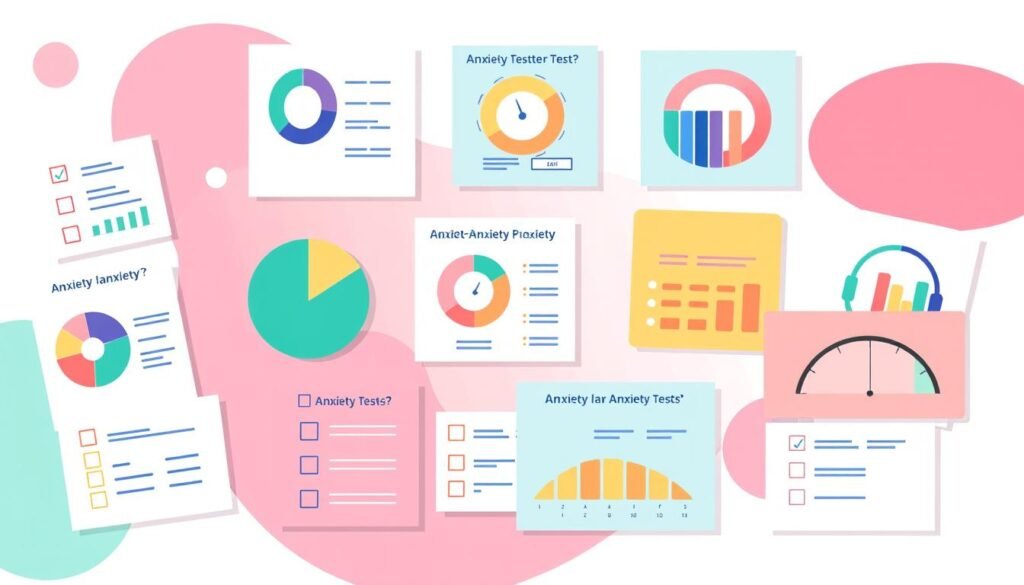Have you ever wondered about your feelings of worry? Are they normal or a sign of something more? Discovering the nature of your anxiety can be enlightening. Millions are affected by anxiety disorders, which influence their daily lives and emotional health. We offer a detailed quiz to pinpoint your anxiety type. This anxiety test checks various symptoms and habits related to anxiety. It helps you see patterns in your feelings and thoughts.
This quiz has 7 targeted questions. They cover excessive worrying, social anxiety, avoiding certain situations, and moments of intense fear. By taking this what type of anxiety do I have quiz, you’ll learn about your own experiences. You’ll find out if you might need more evaluation or help. Knowing your anxiety patterns is vital. After all, over 40 million U.S. adults deal with these disorders. So, are you ready to start taking care of your mental health?
Key Takeaways
- The quiz helps pinpoint different anxiety disorders.
- It includes 7 questions on key symptoms of anxiety.
- It tackles big issues like heavy worrying and social fears.
- The quiz points you toward the right mental health help.
- Knowing your type of anxiety can improve your life.
- With millions affected, understanding anxiety is critical.
Understanding Anxiety Disorders
Anxiety disorders include different conditions with too much fear and worry. They can affect work, relationships, and happiness. To find the right help, one should first figure out if they have an anxiety disorder. There are several types, like General Anxiety Disorder (GAD), Panic Disorder, Social Anxiety, and Specific Phobias.
GAD involves constant worry about many things, making daily tasks hard. Panic Disorder means having unexpected moments of intense fear. Social Anxiety is being very afraid of social situations and feeling judged.
Knowing about these disorders helps us recognize symptoms and find the best support and treatment. Below is a table showing data from a survey on anxiety disorders:
| Attribute | Percentage |
|---|---|
| Respondents taking the test for themselves | 75% |
| Respondents taking the test for someone else | 25% |
| Gender Distribution (Female) | 60% |
| Gender Distribution (Male) | 30% |
| Gender Distribution (Non-Binary) | 10% |
| Age Range (18-24) | 22% |
| Age Range (25-34) | 30% |
| Age Range (35-44) | 18% |
| Age Range (45+) | 30% |
| Respondents with a Mental Health Condition | 40% |
| Respondents who received treatment/support | 45% |
| Impact of External Factors on Mental Health | 65% |
Many things can cause anxiety disorders, like our genes, brain chemistry, life stress, and health problems. A detailed self-check can help us know if we have anxiety symptoms. Then, we can look for the right treatment. Places like the Sterling Institute offer new treatments. These include talking therapy, Transcranial Magnetic Stimulation, and Ketamine Therapy.
Common Symptoms of Anxiety
Anxiety shows up in many ways, touching every part of our days. Knowing these symptoms is key to figuring out when extra support is needed. It can bring on physical, emotional, and behavioral issues. They might be mild or intense, and not always at the same time.
Physical Symptoms
Emotional stress often comes with physical signs. Recognizing these helps us see how our bodies react to anxiety. For example, people with anxiety might have:
- Rapid heartbeat
- Excessive sweating
- Trembling hands
- Fatigue or exhaustion
- Nausea
- Sleep disturbances
These issues are uncomfortable. For more on physical signs of anxiety, check out this guide.
Emotional Symptoms
Our feelings can also signal anxiety. Those dealing with it may feel:
- Persistent worry or fear
- Feelings of dread
- Difficulty concentrating
- Heightened irritability
- Feelings of overwhelm
These emotions can mess with how we interact with others and handle our day-to-day tasks.
Behavioral Symptoms
Anxiety might change how we act too. This includes:
- Avoidance of specific situations or activities
- Increased dependency on others for reassurance
- Changes in appetite or eating habits
- Substance use to deal with anxiety
Spotting these actions helps us better understand our struggles and encourages seeking help. Catching anxiety early means we can get better quicker.
| Type of Symptoms | Examples | Impact |
|---|---|---|
| Physical | Rapid heartbeat, fatigue, nausea | Can lead to discomfort and health issues |
| Emotional | Persistent worry, irritability, overwhelm | Impairs concentration and social interaction |
| Behavioral | Avoidance, dependency, changes in appetite | May affect daily activities and relationships |
Anxiety Types Quiz: Find Your Fit
Understanding one’s anxiety is key for both mental and physical health. An anxiety types quiz helps identify different anxiety disorders through specific questions. These questions are about worry, fear, and how often you avoid things. The quiz results can show which anxiety disorder one might have. This makes it easier to find the right ways to deal with it.
Did you know up to 33.7% of people will face an anxiety disorder sometime in their life? This fact shows how important it is to have tools like the anxiety diagnosis quiz. Knowing if you have Generalized Anxiety Disorder, Panic Disorder, or Social Anxiety helps in choosing the right treatment.
The quiz has 16 questions based on solid research. It asks you to think about how you’ve felt and acted in the past week. It’s important to answer these questions truthfully. Your answers are private and help the Greater Good Science Center evaluate your type of anxiety. Knowing your anxiety type can guide you to the best treatment, like therapy, medicines, or self-care techniques.
After finishing the quiz, you get your results right away. You’ll also find resources and support groups to help you. Taking the quiz is a step towards understanding and beating your anxiety.
Importance of Identifying Anxiety Symptoms
Understanding how to spot anxiety symptoms is key for mental health. Spotting these symptoms early helps people talk more clearly about them. This makes getting help faster and can lead to better results.
Knowing your own anxiety symptoms is important. About one in three adults will face an anxiety disorder at some time. For example, generalized anxiety disorder (GAD) causes ongoing worry in many people. Yet, less than half of those with GAD get help, showing we need more awareness.

Learning about your symptoms is a first step to getting the right help. Anxiety disorders like panic disorder and Social Anxiety Disorder (SAD) have unique signs but similar roots. Not seeing these signs can delay getting help, which could make anxiety worse.
If your anxiety is more than just a little worry, it might be time to seek expert advice. Treatments like Cognitive Behavioral Therapy (CBT) are really helpful. Adding things like exercise and meditation can help too. Taking steps to understand and manage your anxiety can improve your life.
For anyone unsure about their feelings, taking an anxiety self-evaluation can help. It raises awareness and opens up discussion about help.
What Type Of Anxiety Do I Have Quiz
Taking this quiz helps you understand your mental health better. It looks into your feelings and behaviors to spot possible anxiety issues. It’s key to answer based on how you’ve been feeling lately for the most accurate results.
How the Quiz Works
This quiz has a set of questions about how you’ve felt in the past two weeks. It helps point out different signs of anxiety. You’ll answer questions about:
- How often you feel anxious in situations you used to handle
- If worry affects your daily life, like your sleep or focus
- Feeling tired or easily annoyed because of anxiety
- Doing the same things over and over to deal with stress
- Going through severe panic attacks
- How fear of socializing impacts talking to people
Taking this quiz can show if your symptoms match those of certain anxiety disorders. Generalized Anxiety Disorder, for one, involves constant worry that lasts six months or more.
Who Should Take This Quiz
If you’re dealing with anxiety, this quiz can help, especially if:
- You’re not sure about your level of anxiety
- You’ve felt more stressed or anxious lately
- Anxiety is making everyday life or meeting people hard
By understanding your anxiety with this quiz, you can find ways to cope or decide to get professional help.
| Symptom | Never | Rarely | Sometimes | Often | Very Often |
|---|---|---|---|---|---|
| Anxiety about minor issues | 20% | 15% | 30% | 25% | 10% |
| Anxiety causing fatigue | 25% | 20% | 30% | 15% | 10% |
| Difficulty relaxing or sleeping | 18% | 22% | 25% | 20% | 15% |
| Repetitive behaviors to manage worry | 30% | 25% | 20% | 15% | 10% |
| Muscle tension or headaches | 28% | 22% | 25% | 15% | 10% |
| Intense panic episodes | 40% | 25% | 15% | 10% | 10% |
Comprehensive Anxiety Test Options
Online, there are various anxiety tests that help people understand their mental health better. These tests ask a bunch of questions to check mental and physical reactions to anxiety. Taking an anxiety screening is a good first step before talking to a pro about your mental health.
Interesting fact: about 90% of adults with general anxiety disorder feel very irritable when their anxiety gets worse. In comparison, young adults with high anxiety are twice as irritable as those without. For kids with anxiety disorders, 75% say they feel restlessness a lot.
These tests use scores to tell how anxious you might be. You get points for how often you feel a certain way—one for sometimes, two for often, and three for always. A score under 10 means anxiety isn’t a big issue for you. If you get between 10 and 18, it might mean you have generalized anxiety disorder (GAD). A score over 18, or lots of “always” answers, means talking to a pro might help.
The following table shows who takes these anxiety tests and some other details:
| Demographic | Percentage |
|---|---|
| Female | 55% |
| Male | 40% |
| Non-Binary | 5% |
| United States Respondents | 70% |
| Veteran or Active-Duty Military | 10% |
| Caregivers | 15% |
| LGBTQ+ | 12% |
| Healthcare Workers | 8% |
Even though an online quiz can’t officially say if you have an anxiety disorder, it can still give helpful info for when you talk to a counselor or therapist. After seeing their results, people can look into ways to handle anxiety better. This includes mindfulness, exercising regularly, and eating well. You can find tips on these through different online sources. These strategies work to make mental health better and to find ways to cope with anxiety.

Feeling Overwhelmed? When to Seek Help
Knowing when to seek help for anxiety is key. Many people feel overwhelmed and can’t manage daily tasks. It’s important to recognize the signs to get the help needed.
Signs That Professional Help is Needed
There are clear signs that show it’s time for professional aid. If you notice these signs, think about getting help:
- Persistent feelings of panic that disrupt daily life
- Intrusive thoughts that are hard to control
- Emotional exhaustion that impacts motivation and energy levels
- Inability to focus on tasks or responsibilities
- Severe physiological symptoms such as rapid heart rate or muscle tension
Everyone’s experience with anxiety is different. So, coping methods and strategies vary too.
For mild anxiety, things like lifestyle changes may help. But, severe anxiety might need medication and therapy. Mental health resources are crucial as they offer support and individual guidance.
Getting help for anxiety isn’t just about managing symptoms. It’s about leading a healthier, balanced life. Remember, seeking help is a brave step towards feeling better.
Anxiety Disorder Assessment: What to Expect
When seeking an anxiety disorder assessment, expect a thorough process. It is led by skilled mental health experts. They use interviews and questionnaires to understand your situation.
You will talk about your symptoms and how they affect your daily life. Sharing your personal history is also part of it. This helps therapists get a full view of what you’re going through. A quiz may be the first step to identify your anxiety levels.
The Hamilton Anxiety Scale (HAM-A) and the Generalized Anxiety Disorder 7 (GAD-7) are often used. They determine how severe your anxiety is. Knowing this helps to tailor a treatment plan that can include therapy, medicine, and lifestyle changes.
Being open and honest is key to finding the best help. Each year, over 40 million adults in America face anxiety disorders. Early and accurate assessment is crucial. Recognizing the value of these evaluations can lead to managing and overcoming anxiety effectively.

Managing Anxiety: Tips and Techniques
Handling anxiety well needs a detailed and personal plan. People dealing with anxiety gain a lot from using different techniques daily. Here are some top tips to help lessen anxiety:
- Mindfulness Exercises: Mindfulness keeps you in the now, cutting down stressful thoughts.
- Cognitive-Behavioral Strategies: It’s about finding and changing thoughts that cause anxiety.
- Physical Activity: Exercise boosts your mood and lowers anxiety by releasing endorphins.
- Quality Sleep: Getting enough sleep greatly betters mental health and eases anxiety.
- Relaxation Techniques: Deep breathing and yoga are good for daily relaxation.
- Social Support: Having supportive friends and family is key during tough times.
- Professional Therapies: Therapies, especially CBT, work well against negative thoughts and actions.
Adding these methods to your routine promotes an active fight against anxiety. With anxiety affecting 301 million people worldwide, effective coping strategies are clearly needed. Everyone should find what techniques suit them best and also seek professional advice if needed.
Conclusion
Knowing how to identify anxiety is key to managing and treating it effectively. The “What Type of Anxiety Do I Have Quiz” offers valuable help. It allows people to easily check their anxiety levels. Based on their answers, they can see if they are Mostly A’s, Mostly B’s, or Mostly C’s.
People scoring Mostly A’s may have good coping skills already. Those with Mostly B’s might need to find more ways to handle anxiety. If someone gets Mostly C’s, it may show they have a tough time with anxiety. They might need extra support and resources. This quiz points them to the right resources and helps improve their coping methods.
Creating personal plans to lessen anxiety is very important for a better life. For example, about 5% of young people face Social Anxiety Disorder. Getting help is a smart move. Using this quiz is a big step towards a healthier mind and overall well-being. Also, the GAD-7 scale is great for measuring anxiety levels. It can guide you towards a positive way to deal with it.